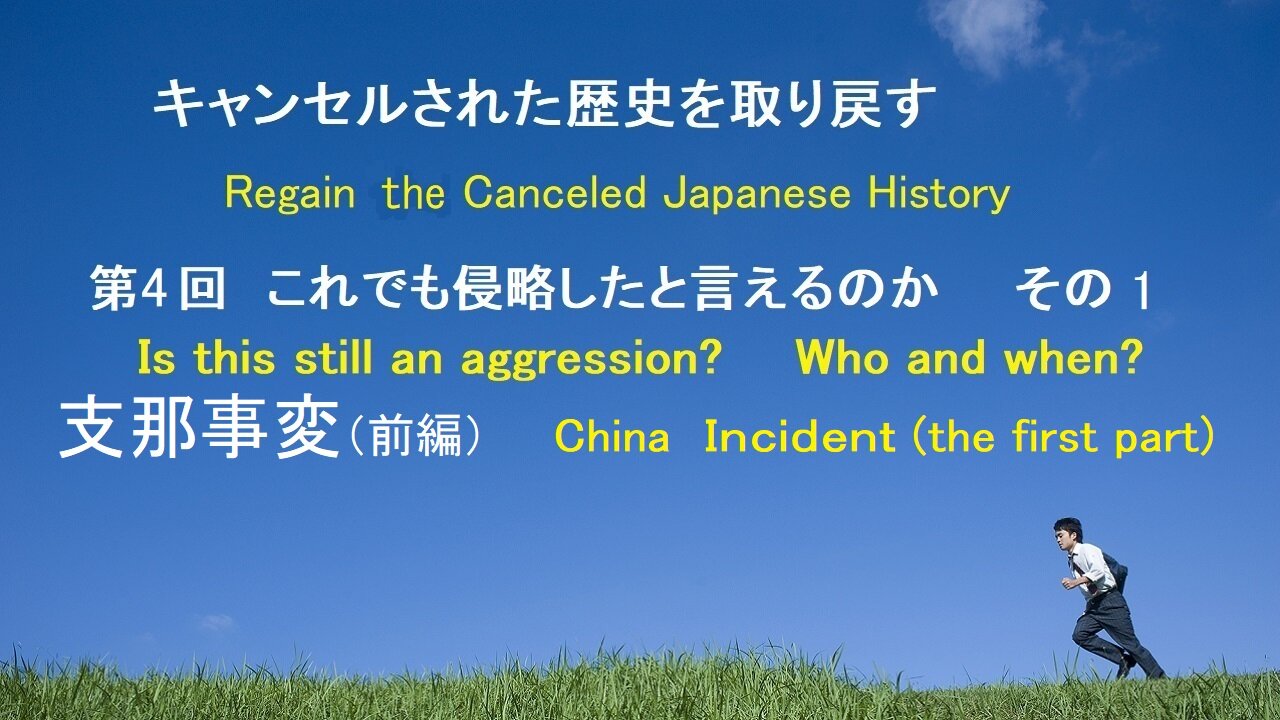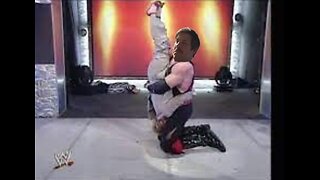Premium Only Content

The 4 "Regain The Canceled Japanese History" Japan-Sina Incident I
Hello everyone. My name is Saimoji Sakura. I am the teacher of this class. The lesson 4, Regain the Canceled Japanese History is “Is China Incident still an invasion by Japan? “
In Japan, there had been samurai who valued morals and law for a long time, and it seems that they had influenced the general public.
Many foreigners who came to Japan during the Edo period are actually surprised by the politeness, kindness, and good security in japan.
Japan even took an international law scholar to the battlefield and fought a war with Russia.
In addition, page 179 of the Tokyo Shoseki wrights that the treatment of prisoners of war during the Meiji era was humane in accordance with international law.
Even during the last battle against Nanjing Castle in the Chinese incident, Japanese soldiers were ordered to respect international law and prohibit illegal acts.
While being shot by enemy's anti-aircraft guns, the Japanese pilot plunged,
then sprinkled surrender advisory flyer from the plane, but was rejected by the Chinese army in Nanjing.
It is easy to be misunderstood by those who have no military experience, but there are rules for war, and those who break these rules and fight will be given the severe punishment of death penalty in some cases, regardless of enemy or ally.
It's about fighting among civilians without wearing military uniforms, and using hided their weapons.
There was an implicit understanding that the Japanese army was required to have very strict discipline compared to foreign troops because the Japanese army was the army of His Majesty the Emperor, and the illegal acts of Japanese soldiers hurt dignity to His Majesty the Emperor.
It was raised in 1938, but Chiang Kai-shek's military adviser was a German military officer.
They gave know-how the construction of tochka(pillbox) networks around Shanghai, and were still a military adviser during the Battle of Nanjing in December 1937.
Shanghai was divided into Nantao, which is controlled by the Chiang Kai-shek government, and the concession, where Japan, the United Kingdom, the United States, and France have police and administrative powers.
As shown in the table, the Soviet Union also assisted Chiang Kai-shek in 1937 with aircraft, tanks, and trucks, as well as the United Kingdom and the United States.
Especially in the United States from 1927. That is why Chiang Kai-shek confidently armed his army and challenged Japan.
In this respect, the strategic objectives of Britain, the United States and the Communist International were the same.
With 50,000 troops of Chiang Kai-shek, the Imperial Japanese Navy Land Force, which protects the Shanghai concession, was attacked with a machine gun.
Therefore, a rescue army commanded by General Matsui Iwane landed in Shanghai, but there was a strong pillbox and creek networks under the guidance of the German military advisory group.
Due to the state-of-the-art weapons and the military guidance of the German advisory group, the Japanese army suffered great damage immediately, causing 40,000 casualties in about three months.
For this reason, the Japanese army carried out a landing operation behind the enemy, and as a result, the Chiang Kai-shek army collapsed and retreated to Nanjing.
However, textbooks and schools still teach that Japan has invaded which Britain, the United States and China claims.
For example, in Tokyo Shoseki, Japan, which controlled Manchuria, further invaded northern China. It states that the Sino-Japanese War began in July 1937, triggered by the Marco Polo Bridge Incident.
You have to check the information. It is important to have an attitude of giving an answer after wondering whether it is true or why.
Even so, Japan needs to negotiate and agree with the other party to end the war.
However, the strategy of the Communist International and the United States and Britain was to drag Japan into a long-term war, so when we think about it now, there was absolutely no ceasefire.
It may come what Japan's failure and Japan's reflection on it is that Perhaps Japan didn't see the intentions of Britain, the United States, and the Soviet Union, and went too deep into the strategy of them.
So did Japan invade the continent of China, or was it not?
The answer was that Japan had no intention of invading, but as Japan continued to attack enemy territories for defense, the result came to be called aggression.
The definition of aggression is also ambiguous, and each country freely interprets it as it is convenient for themselve and accuses it of invading the other.
Please see the table to think about it.
You can see why Chiang Kai-shek, who studied abroad in Japan and has experience in the Japanese military, had to fight Japan.
Students studying in textbooks other than Jiyusha may not understand the meaning of Comintern.
Japan has two war experiences, Japan-sino War and Japan-Russia War, on that wide Chinese continent.
We knew how difficult it was to fight a war on the continent, both physically and economically.
Therefore, Japan really does not want to go to war.
With the money to go to war, Japan would have wanted to invest more in Manchuria, Korea and the country.
For Japan's security, it was important for Manchuria and the Korean Peninsula to develop and be economically stable.
However, the interests of Japan and other countries are not the same.
It didn't happen.
Japan had already lost the information warfare and conspiracy war against Japan. Goodbye everyone! See you again.
-
 LIVE
LIVE
Vigilant News Network
13 hours agoBill O’Reilly Drops METEOR News Story, Leaves Panel Speechless | The Daily Dose
1,972 watching -
 LIVE
LIVE
Jeff Ahern
1 hour agoFriday Freak Out with Jeff Ahern (6am Pacific)
198 watching -
 1:25:27
1:25:27
Game On!
9 hours ago $8.38 earnedJameis Winston and the Browns UPSET the Steelers in a blizzard!
13K1 -
 12:59
12:59
Film Threat
15 hours agoGLADIATOR II EARLY REVIEW | Film Threat Reviews
16.6K4 -
 11:22
11:22
IsaacButterfield
1 day ago $2.88 earnedThe Shocking Truth About Fat Kids! (Ozempic For 6 year olds)
19.3K18 -
 1:02:48
1:02:48
PMG
1 day ago $7.63 earned"Missiles FIRED! Russia Hit By Ukraine!!! IS THIS WWIII?!"
18.9K2 -
 10:34
10:34
justintech
21 hours ago $17.35 earnedBest Gaming PC Under $1000! - In 2024
64.4K8 -
 9:34
9:34
Dr David Jockers
18 hours ago $17.71 earnedThe Shocking Truth About Butter
103K7 -
 9:05
9:05
Bearing
1 day agoJaguar's Woke New Ad is SHOCKINGLY Bad 😬
43.4K107 -
 7:55
7:55
Chris From The 740
17 hours ago $10.35 earnedWill The AK Project Function - Let's Head To The Range And Find Out
37.1K9